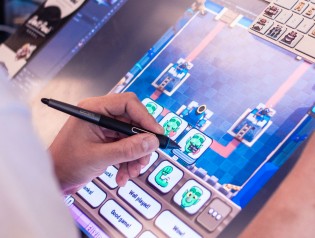-

Supercell dodged ‘the great resignation’, but it’s doubling down on staff wellbeing anyway
“We work with a company who did a whole bunch of training to increase awareness of mental health and also reduce the stigma,” says Mansford. “If people aren’t talking about it, then that’s a problem in itself.” Staff can ask to be trained like mental health first aiders under a program called ‘Jedis of the mind’, and in Helsinki there’s a psychologist on-site twice a week. There are a raft of other training and online resources for staff who want to learn more in a less public way as well.

Supercell talks breaking the mould of puzzle games with Clash Quest
"In my experience, whenever you change some design fundamentals, the whole game needs to be built in a different way. I don’t think many players will notice these differences, but they can have a big impact on how the game needs to be built.”

Supercell CEO thrives on trusting the instincts of game developers
Our threshold for releasing anything to beta should be low, but our bar for releasing anything globally should be high. But one way to fail as a company would be you paralyze yourself. Nothing is ever good enough and you don’t put anything out. One thing we fundamentally believe in is that how we ultimately achieve the best quality is we learn as quickly as possible. If you never ship anything to real players, you never learn, and you never achieve ultimate quality.

Less management, more success - Inside Supercell's upside-down organization
There is no greenlight process from management, no milestone meetings where teams need to justify their project’s existence to finance. Teams can kill their games and move on if deemed necessary. All creative decisions are up to the teams. So the role of management in an upside structure? Build great teams, and support them in their efforts in order to facilitate their success.

What happens when you turn a studio upside down?
"I kept looking for approval. I kept going, 'Well, if I tell the game lead and he says it's okay then maybe it's okay,' and he was just like, 'Ah, do whatever, it's fine.' So I said, 'Well if I talk to 50% of the people on the team and they all say it's fine,' and I kept looking. 'What is the threshold for this is okay to do?' And the answer was, 'If you think it's the right thing to do, then do it, but also own it if it ends up being wrong.'"

Trust Games
It all starts from trust. If the team's working independently, it can't work without trust. That trust needs to be mutual. The management needs to trust their developers to make great games, but the developers also need to trust the management to have their backs. If developers are afraid of failing because there will be consequences, then they won't take risks.

Success and sustainability at Supercell
"Gaming is a creative business, and it's not about the hours you put in. Of course, sometimes you need to put in long hours, and the Brawl Stars team has been working super hard over the last two months. But that can't be the de facto way of working. Sometimes it can happen, but it can't be a rule. We're in a creative business and I just can't believe that people would come up with creative ideas if they're really, really tired or at risk of being burned out.”

Brawl Stars is nearing its global launch
Development on Brawl Stars began around four years ago, and according to Jon Franzas, a designer and programmer who initially served as the project lead, it changed a lot over that time. “As a company we don’t have so much experience with this type of game,” Franzas explains. “So we wanted to launch it very early, in a very raw and unfinished state.”
News Archive
Level Up
Level Four – How to Become a Game Developer
Working in the games industry is a dream for many people – it certainly was, and still is, for us. Even though we are at the beginning of our careers, we wanted to share how we ended up here. We hope that describing our paths could be helpful for some of you with similar curiosity or ambitions.
News
Better Games Together
As gamemakers, our mission has always been to create unforgettable experiences that entertain, bring joy and connect people with each other. We believe that striving towards a diverse, inclusive and equal representation amongst our industry, teams and games, brings us closer to that goal and enables us to make Better Games, Together.
Level Up
Level Three – Brainstorming 101: From idea juice to the best possible game design
When we began to make our current game project, everything started with a brainstorming session. This is the first big step in the game development process at Supercell, and the teams here go about it in a way that is true to our values. When brainstorming, it is essential to remember that we should not be too critical of the ideas that we present, and the brainstormers should not overthink too much.
Careers
On The Job: A UI/UX Artist’s Story
Supercell is home to many different professionals. Read on as one of our UI/UX artists tells how they experience working at Supercell being like.
News
Supercell at the Game Developer Conference 2022
Three domains, three Supercellians, three highly anticipated presentations
Level Up
Level Two – Freedom and Responsibility
Welcome to Level Two! Now that we have been here for over two months, we want to check back in at the next level to give you some more ideas about what it is like to be part of a team at Supercell.







